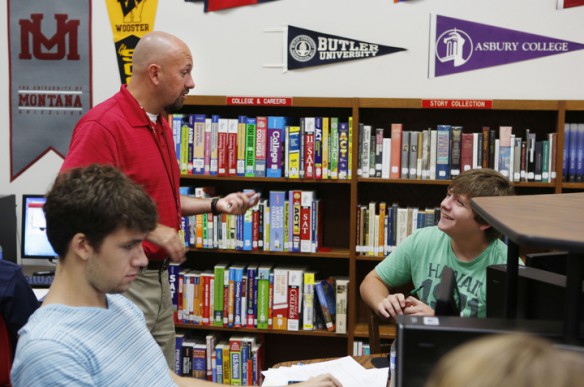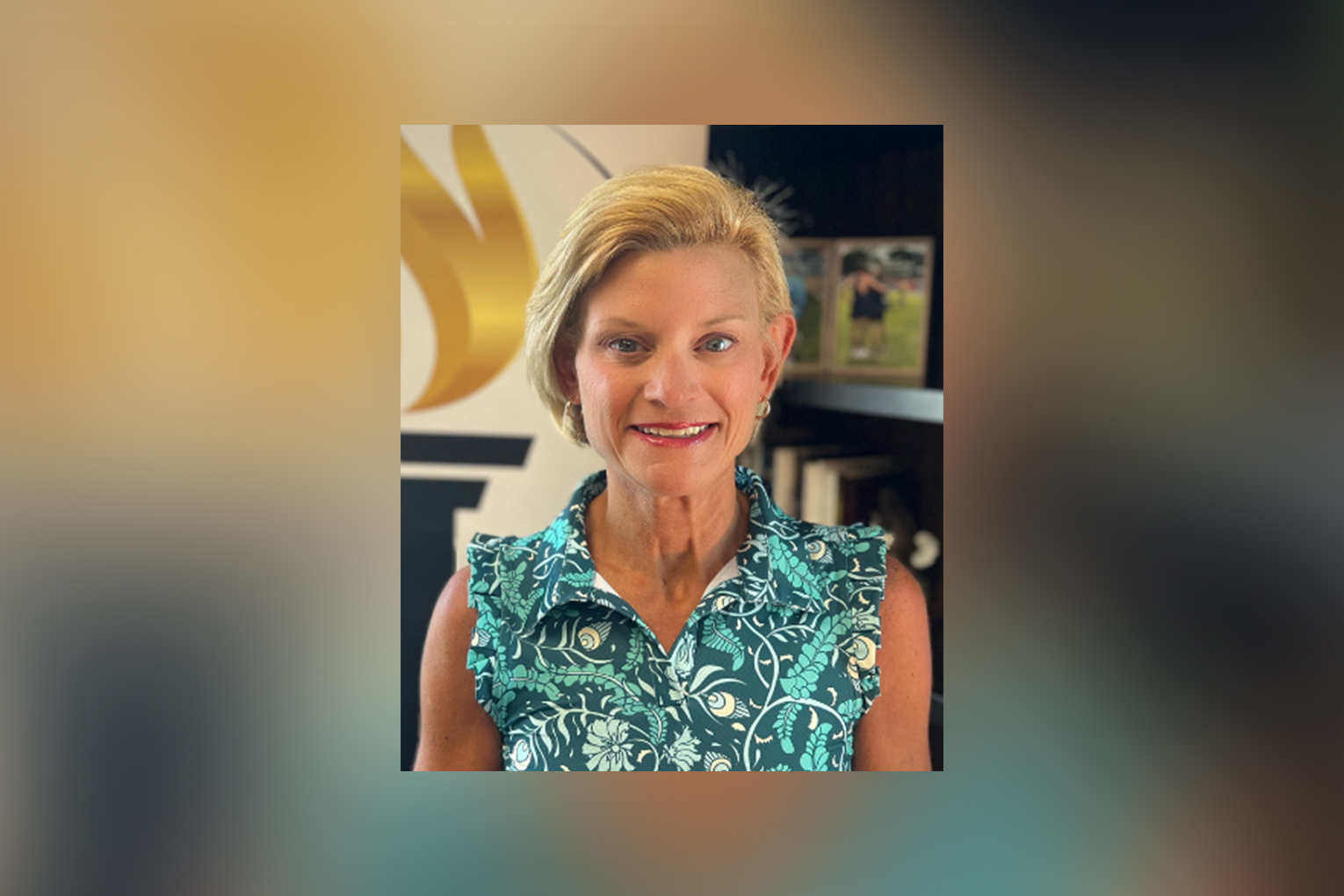
Counselor Chris Reeves talks with senior Robby Rundle about his essay for the Common App during College Application Boot Camp at Beechwood High School (Beechwood Independent). Rundle plans on studying criminal Justice. Photo by Amy Wallot, Aug. 6, 2013
By Susan Riddell
susan.riddell@education.ky.gov
Students at Beechwood (Independent) High School recently participated in a weeklong boot camp, but they weren’t focused on getting their bodies in shape. Instead, they were shaping up their skill set for applying to college.
“Getting into the right college is becoming such a competitive process,” said Beechwood guidance counselor Chris Reeves, who organized the week for roughly 50 rising seniors. “I wanted to give these students a chance to really get some individual attention and feedback regarding their essays and applications.”
Students participated in half-day sessions. At the beginning of the week, Reeves used role reversal to show the students what college application readers are looking for in essays and how they might judge them.
Students worked in groups and read the essays of fictional students Angela, Jimmy, Max, Rodney and Juliana. Reeves had groups admit two, waitlist one and decline admission to two.
It proved to be an eye-opening experience several of the students said. Reeves made sure to point out how the task also gave students insight into the importance of making a good first impression and understanding that the decisions college staff make often are immediate.
Students said they saw firsthand how applications can be viewed very differently depending on who is looking at them. Both morning and afternoon sessions of boot camp students admitted, declined and waitlisted different students.
Angela came from a poor family and had characteristics that indicated she could excel at a small liberal arts school, but students were mixed on whether or not she deserved acceptance.
Max had great test scores, “but his essay sounded arrogant,” one of the students mentioned. Jimmy also possessed some strong qualities, but a few students said his essay didn’t seem genuine either.
The boot camp also placed a heavy emphasis on resume writing. Reeves brought in college staff to meet with students individually about their resumes and essays.
Bryan Conover, assistant director of admissions for Transylvania University, spoke with students and emphasized they needed to be proud of their applications and take ownership of them.
“Understand that this may be the only perspective a college has about who you are,” he told them. “When it comes to the application essay, it should convey something about your personality of which you are proud, but is not supposed to be an academic piece.”
Reeves also guided them on essay writing. His recommendations included:
- It’s not about the topic. It’s how the applicant comes across in a creative way.
- If an applicant is not afraid to share his or her opinion, a controversial topic can be a good thing.
- Show them that you’re not a perfect person. You have faults and weaknesses, and that’s OK.
- Keep an introduction brief and memorable. Draw the person in.
Katy Whitpan, a regional recruiter for the University of Alabama, said admissions recruiters are always impressed with students who show they are prepared and willing to take initiative, especially in the early stages of choosing a college or university.
“The earlier that a student can begin the admission process for a particular college, the more opportunities that become available for them to develop a relationship with their admission recruiter,” Whitpan said.
That opens the doors to more personalized attention and assistance, she added.
“As recruiters travel heavily throughout the fall semester, we meet a very large number of students on a daily basis, so if we have already established a relationship with a particular student, we will remember that student and will make a point to continue reaching out to them,” she said.
Reeves said he was very pleased with how well the boot camp went, and that the students felt sitting down with the college representatives was the most valuable part of the process.
“Just being able to talk about their essays and get feedback helped them from ‘being stuck’ to moving forward,” he said. “My biggest surprise was probably just how much each student accomplished when given the chance to conference with someone.”
Students filled out a survey at the end of the week on how much they got out of the boot camp. Reeves said he will use that information to guide him next summer with a second camp. He also noted that teachers can benefit from his experience in seeing the results from a student sitting down with an expert to discuss his or her work individually.
“I think what teachers across Kentucky should know is that real progress, and growth comes from sitting down one on one with the student,” Reeves said. “When asked in the program evaluation the most valuable aspects of the camp, one of my students said, ‘having immediate feedback from someone who knows what they’re doing.’”
What else can teachers do?
Whitpan and Conover agreed that teachers also can aid students in the college application process.
For Whitpan, who recruits students in Kentucky to apply at the University of Alabama, she recommends teachers connect classrooms with the commonalities of a college classroom whenever possible so students will better understand expectations.
Goal setting is important, too, she said.
“Regular goal setting can be extremely beneficial as well as projects that help students assess where they fall in completion of their goal,” Whitpan said. “In addition, many colleges will provide checklists for students to follow beginning from their freshman year, and it is important for teachers to incorporate those into the classroom as well.”
Conover advises high school teachers and counselors to create partnerships specifically designed to ease the college search process for students. These partnerships, he said, can eventually show school administrators the value in giving students extra time to explore more options and find the right college fit.
“Allowing students to invest time in meeting with admissions representatives and visiting college campuses must be a priority,” Conover said.
“Finding innovative and creative partnerships with guidance staff and colleges can help students understand their options and achieve their dreams,” he added. “This is an exciting partnership with Mr. Reeves to help students improve their applications and chances for success. I hope to see other schools and districts employ similar programs to help Kentucky students achieve all they hope to achieve.”
MORE INFO …
Chris Reeves, chris.reeves@beechwood.kyschools.us, (859) 331-1220, ext. 6807




Leave A Comment